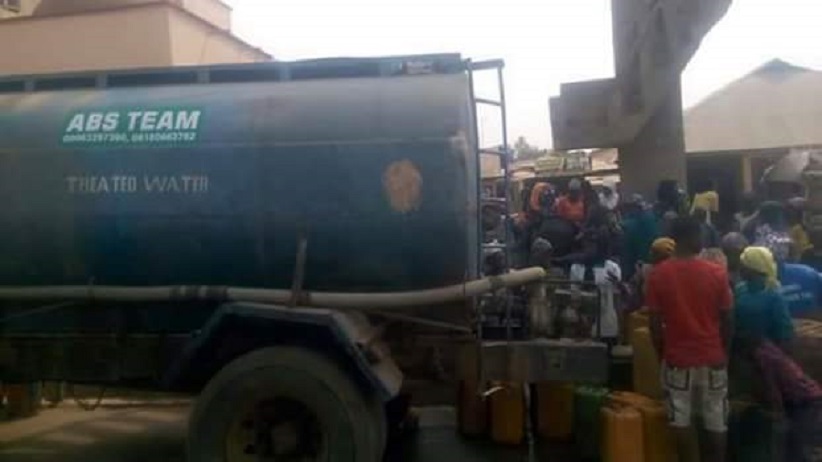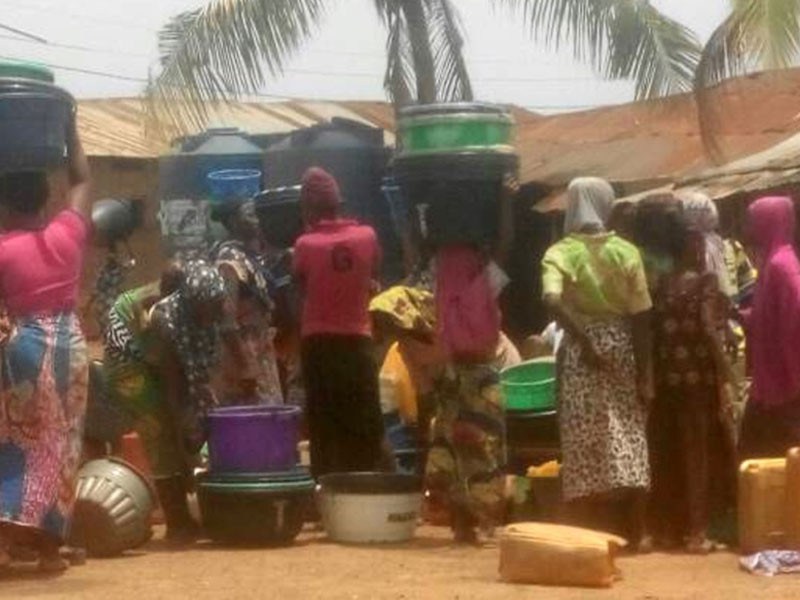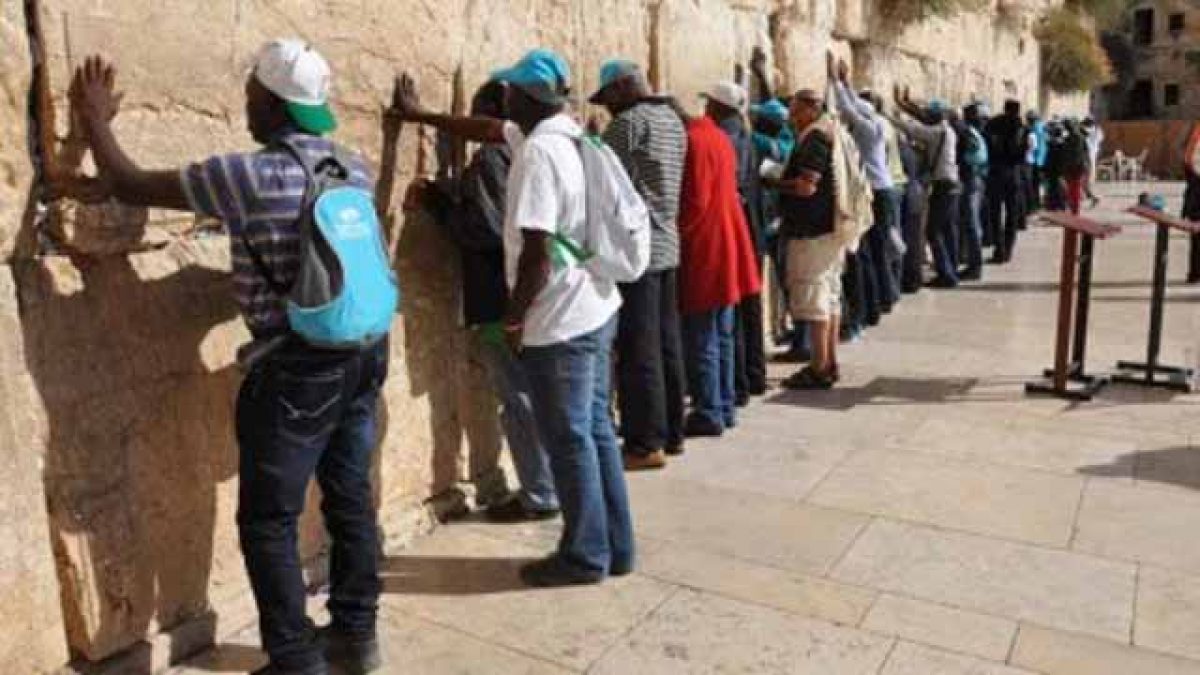Feature/OPED
The Multi-Billion Naira Water Reticulation Project in Ilorin: A Scam?

By Abdullateef Alagbonsi
Water is a necessity for life and it is the responsibility of every responsible government to give priority to provision of good water. The unmatchable importance of hygienic water to human survival has triggered the consciousness of some international organisations to flag off different water provision programs for developing countries including Nigeria.
Ilorin metropolis has three water dams (Asa dam, Agba dam and Sobi dam) with capacity to supply water to every part of the city and take care of any expansion in the future. Asa dam, which has capacity to supply water that would cover up to 60% of city of Ilorin, supplies water to Kuntu, Alore, Taiwo road, Mandate, Al-hikma, etc. The dam is a water flow with high water level and capacity to supply water to Agba dam during dry season. Sobi dam is also a river flowing dam with capacity to supply water to up to 30% of total area of Ilorin. The dam already supplies water to areas like Shao, Shao garage,
Sobi barrack, Gambari, Aiyegbami, Madinat and some other areas of Ilorin. Agba dam, which is a lake, can only supply water to about 15% of Ilorin metropolis during rainy season while it would depend on Asa dam during dry season to effectively supply water around its circus. Though the pump to make that achievable had been procured for over 4 years, but it can’t be ascertained if the pump has been put in use as at this moment. All these show that there are enough water sources in Ilorin, and there is no need for government to make water source as an excuse.
Ilorin water reticulation project, which is meant to make water available to the nooks and crannies of Ilorin metropolis, is one of the major projects inherited by the current administration of Alhaji Abdulfatai Ahmed from his predecessor, Dr. Abubakar Bukola Saraki.
It involves water distribution network that will provide water routes to the consumers after it has been collected and treated. Being the capital city of Kwara state, Ilorin continues to expand on daily basis and the need to expand the water radius becomes very inevitable.
When completed, the project is expected to increase the coverage of potable water distribution infrastructure in Ilorin metropolis.
The project started in year 2009 and has remained one of the most controversial projects since that time. It has gulped several billions of naira since almost a decade that it commenced but it’s sad that the light has not been sighted at any end of the tunnel.
The general public may wish to be reminded of a publication in Vanguard Newspaper dated October 7, 2014 that reported Mr Yomi Ogunsola, who was the Senior Special Assistant to Governor Abdulfatah Ahmed on Investment Promotion and Strategy, to have said in an interview with News Agency of Nigeria that Ilorin water reticulation project cost is N7.2 billion.
He also disclosed in the same interview that the state government had earlier spent more than N5.2 billion on the project. Interestingly, he boastfully disclosed that the project was at 98% completion stage as at that time.
In a statement published by Ilorin.Info on January 10, 2018, Barrister Abdulrazaq Akorede who is the state Commissioner for Water Resources, was quoted to have said that with the level of work done so far as at that time, the project would be completed by May or June, 2018. He also disclosed the ongoing interventions on some water projects across the state and lamented the destruction of some water project facilities by some vandals.
On February 2, 2018, the Kwara state government, through her official website, disclosed that she is set to commence the testing of the Ilorin Metropolis Water works following the completion of the reticulation project.
Moreover, the Governor approved the diversion of water mains to the Western reservoir and other overhead tanks that supply water to 50% of Ilorin due to some ongoing projects in the state.
In a statement published by National Accord Newspaper on April 18, 2018, the General Manager of the State Water Corporation, Alhaji Tunde Yahaya, was specific in his disclosure that the Primary phase of the Water Reticulation project had been completed, and conducted Journalists around the 5 water works in Ilorin metropolis.
He also disclosed that the tertiary phase of the reticulation project, which involves laying of pipes into street and homes and repair of damaged pipes, had been captured in the 2018 budget and will soon be commenced.
In a statement published by Ilorin.Info on June 1, 2018, Governor Abdulfatai Ahmed made the following interesting revelations in an interactive session with journalists on May 31, 2018.
First, N8 billion has been committed to the Ilorin water reticulation project in the last 7 years to tackle the problems of water supply in the state.
Second, the project was categorised into 3 sections: primary, secondary and tertiary.
Third, the primary section has been completed, while the remaining secondary and tertiary sections will soon be completed.
Fourth, his administration had renovated about 17 water works across the state.
Fifth, his administration had provided boreholes to over 400 communities in the state.
We wish to remind the public that sometimes in 2014 (5 years after the project commenced), the then Senior Special Assistant (SSA) to Governor Abdulfatai Ahmed on Investment Promotion and Strategy, Mr Yomi Ogunsola, explained that “the state government had earlier spent more than N5.2 billion on the project and the project was at 98 per cent completion stage while the water pipes would be connected to the water mains soon”.
It would also be of great interest to let the public have little idea of billions of naira that had been committed to water project (including Ilorin water reticulation) in the state since 2009.
In 2009, N6.79 billion was spent on water project. Out of this sum, N4 billion was gotten from the N17 billion bonds that the state sold in year 2009 by the state Governor as at that time, Dr Abubakar Bukola Saraki for Ilorin water distribution project and Asa dam mixed use development.
Specifically, a sum of 2 billion naira was committed directly to the water reticulation project).
2010 – N2.65 billion 2011 – N983.57 million
2012 – N1.44 billion 2013 – N612.25 million
2014 – N360.80 million (due to recession and low FAAC to states)
2015 – N749.11 million
2016 – N350 million (spent on Ilorin water reticulation alone.
Effort to get the total funds expended on water project could not be ascertained as at this moment but the estimate has it to be about N1.2 billion).
In conclusion, as a Civil Society Organisation occupying the highest office in the society (office of the Citizens) and advocating for open leadership and good governance in Kwara state, the salient questions ENetSuD wants the government to answer are:
Despite the billions of tax-payers monies spent on water projects (including water reticulation), where is the water?
Since 2014 that 98% completion was achieved, funds have been annually allocated and released for the water reticulation project. Why has the remaining 2% of the project not been completed since 2014 to ensure citizens’ access to good water and provide value for all our billions of naira spent so far since 2009?
Since N8 billion committed on the project in the last 7 years is more than the total project cost of 7.2 billion naira, why has only the primary phase been completed so far?
Now that the secondary and tertiary phases have been included in the recently approved 2018 budget, how much is the government planning to spend on these phases? Are these phases part of the remaining 2% completion as at 2014?
When will the secondary and tertiary phases of the water reticulation project captured in the 2018 budget be completed?
This article was written by Dr Abdullateef I. Alagbonsi, ACPA, Ph.D. He is also the Coordinator of www.ENETSUD.ORG He can be reached on info@enetsud.org.

Feature/OPED
How AI is Revolutionizing Sales and Business Development for Future Growth

By Olubunmi Aina
Many experts have highlighted the growing impact of Artificial Intelligence (AI) across the financial industry, and I would like to share my perspective on a key functional area that typically drives business growth and profitability— sales and business development professionals and how AI is impacting their work.
Sales and business development professionals are often regarded as the engine room of an organization, thanks to their eye for business opportunities, ideation and conceptualization, market engagement and penetration expertise.
AI is enabling sales and business development professionals to automate tasks, take meeting notes, analyze data, and personalize customer experiences, all of which are embedded within CRM (Customer Relationship Management) systems. A CRM with an AI tool is what forward-thinking businesses are leveraging to manage leads, customer data, customer interactions, notify and remind professionals to take action when due, drive growth and profitability.
This is why it is crucial for these professionals to invest heavily in AI knowledge to remain globally competitive. This can be achieved through self-study, attending industry events, or consulting with leading technology companies that have embraced AI, such as Interswitch Group, AI In Nigeria, and Revwit.
Most importantly, to maximize the potential of AI, sales and business development professionals must pay close attention to customer interactions. and ensure they collect high-quality data. Feeding the data repository or CRM Systems with valuable insights and data from real customer engagement is key to getting AI to produce near accurate insight for effective results.
AI will continue to be a key driver of business growth and decision-making in the years ahead. If you are yet to embrace it, now is the time. Keep learning!
Olubunmi Aina is the Vice President, Sales and Account Management at Interswitch Group
Feature/OPED
Mother’s Day: Bridging Dreams and Burdens With Global Marketplace Success

Motherhood in Nigeria is a dynamic force fueled by strength, resilience, and unwavering love. As Mother’s Day approaches, we celebrate the women who carry the weight of their families and communities, often while nurturing their dreams. From bustling market traders to ambitious entrepreneurs, Nigerian mothers are a force to be reckoned with.
However, the reality is that balancing these roles can be incredibly challenging. The daily hustle, coupled with the rising cost of living, often leaves little time or resources for personal aspirations. This is where the digital marketplace and platforms like Temu are beginning to play a significant role, not just in Nigeria but globally.
For Stephanie, a Nigerian hair and beauty influencer navigating the demands of work and motherhood, the ease of online shopping became invaluable. She discovered that purchasing baby necessities, like baby high chairs from Temu, from the comfort of her home significantly simplified her life, granting her more time to dedicate to her family and professional pursuits.
Beyond convenience, digital platforms are also fueling entrepreneurial success for women. Caterina Tarantola, a mother of three, achieved the remarkable feat of opening her translation and interpretation office in just 15 days. Her secret weapon was also Temu. Initially skeptical of online shopping, she found it to be a personal advisor, providing everything from office furniture to decor, delivered swiftly and affordably. This kind of direct access is precisely what can empower many Nigerian mothers who strive to maximise their resources and time.
Similarly, Lourdes Betancourt, who left Venezuela to start a new life in Berlin, turned to Temu when launching her hair salon. By sourcing essential supplies directly from manufacturers, she avoided costly markups and secured the tools she needed to turn her vision into reality.
Since Temu entered the Nigerian market last November, more Nigerian mothers have embraced the platform to access quality, affordable products. By shopping online instead of spending hours at physical markets, they can reclaim valuable time for their businesses, families, and personal growth.
This shift reflects a global trend as consumers worldwide seek convenience and affordability. In response, Temu has rapidly grown into one of the most visited e-commerce sites and was recognized as a top Apple-recommended app of 2024.

The digital marketplace, while still developing in a place like Nigeria, presents a significant opportunity for empowerment. The progress made thus far highlights the tremendous potential for positive impact.
This Mother’s Day, we celebrate Nigerian mothers’ strength and adaptability. Like Stephanie, Caterina, and Lourdes, they are turning challenges into opportunities—building brighter futures for themselves and their families with the support of innovative online platforms like Temu.
Feature/OPED
Sacred Journeys, Earthly Burdens: The Cost of Nigeria’s Pilgrimage Economy

By Prince Charles Dickson PhD
The desert does not care for your prayers. It swallows them whole, along with your sweat, doubts, and wallet weight. Yet here we were—Nigerians in Jordan, then Israel, tracing paths carved by prophets and kings, stepping on stones smoothed by millennia of footsteps. From the Dead Sea’s buoyant bitterness to Bethlehem’s star-marked grottoes, the land thrums with sacred electricity. But as she walked, she couldn’t shake the question: What does this cost us? Not just in naira, but in soul.
You remember the chaos—Abuja’s airport buzzing with first-time pilgrims clutching rosaries and Qurans, tour guides shouting over the din, warnings about “japa temptations” mingling with sermons. For many, this was a once-in-a-lifetime escape: from potholed streets, blackouts, and the gnawing uncertainty of survival back home. Yet even here, in the shadow of Herod’s stones and Galilee’s shores, Nigeria followed us. The tour operators in Jordan haggled like Lagos market women; Israeli border guards scrutinized our green passports with weary suspicion. And beneath it all, the Gaza war hummed like a discordant hymn, a reminder that holiness and human conflict are ancient bedfellows.
Let’s talk numbers; if a single pilgrimage package costs roughly N3.5 to N5 million per person, multiply that by thousands of pilgrims annually, and Nigeria bleeds billions into foreign economies.
In Jordan, our guides grinned as they narrated Petra’s history, their pockets fattened by dollars. In Israel, the pilgrimage industry is a well-oiled machine: hotels near Nazareth charge premium rates, Dead Sea mud is packaged and sold as divine therapy, and even the Via Dolorosa has a gift shop. Meanwhile, back home, nurses strike over unpaid wages and students scratch equations into dust-choked chalkboards.
The Catholic Bishops’ recent call cuts like a knife: “Stop funding pilgrimages. Let faith pay its way.” Their logic is mercilessly practical: why should a nation drowning in debt—where 63% of citizens survive on less than $2 a day—subsidize spiritual tourism for a privileged few? The National Hajj Commission (NAHCON) and Christian Pilgrims’ Board, riddled with corruption scandals, stand as monuments to mismanagement.
Remember the 2017 scandal where officials embezzled ₦90 million meant for pilgrims’ visas? Or the 2022 Hajj airlift fiasco that stranded thousands? These boards, the bishops argue, “serve neither their adherents nor the nation.”
Yet, the allure persists. For many pilgrims, government sponsorship isn’t just a subsidy—it’s a lifeline. “I saved for ten years,” a retired teacher from Enugu told me, her eyes glistening at the Jordan River. “Without the board’s help, I’d never see Jerusalem.” Herein lies the paradox: pilgrimage is both a spiritual awakening and a symptom of systemic failure. When the state funds faith, it commodifies it—and when it withdraws, it risks severing the vulnerable from their solace.
Ah, the pilgrims themselves! Nigerians are nothing if not theatrical. There were the “Captains”—self-appointed prayer warriors who bossed others around like generals in God’s army. The Comedians, crack jokes at Caiaphas’ dungeon to ease the tension. The Holier-Than-Thous, who tsk-tsked at women’s uncovered hair while surreptitiously snapping selfies at Golgotha and the quiet ones, like the widow from Sokoto who touched the Western Wall and wept without sound.
But spirituality here is tangled with spectacle. At the Dead Sea, I watched a pastor bottle the salty water, declaring it “a weapon against household witches.” In Bethlehem, traders hawked olive-wood crosses next to “I Error! Filename not specified. Jesus” t-shirts. Is this awakening? Or is it the monetization of longing?
The bishops’ critique is not just fiscal—it’s theological. “True faith,” their statement insists, “is not measured in miles travelled but in mercy shown.” They urge a reckoning: if Nigeria redirected pilgrimage funds to healthcare, education, or infrastructure, could that itself be a sacred act? Imagine N30 billion—the approximate annual cost of state-sponsored pilgrimages—channeled into neonatal clinics or rural electrification. Would that not honor the “least of these” whom Christ called us to serve?
But the counterargument simmers: pilgrimages foster unity, they say. On that flight to Tel Aviv, I saw Muslims and Christians swap snacks and stories. A Hausa imam helped a Yoruba grandmother fasten her seatbelt. For a moment, Nigeria felt possible again. Yet this fragile camaraderie exists in a bubble—one paid for by a state that can’t fix its roads.
You asked me, “Can’t we have both—pilgrimages and progress?”* Perhaps. But not under this broken model. Here’s the radical alternative:
Decouple State and Sanctuary: Let religious groups self-organize pilgrimages, as the bishops propose. If a church or mosque can rally its flock to fund journeys, so be it—but without dipping into public coffers.
Audit the Sacred: Demand transparency from pilgrimage boards. Publish budgets, punish graft, and let pilgrims know exactly where their money goes.
Reinvest in the Here and Now: Redirect saved funds to tangible ministries—hospitals, schools, food banks—that embody “love thy neighbour” more vividly than any tour group.
On our last night in Jerusalem, I sat with a group under the stars. Nima from Plateau said quietly, “I came to feel closer to God. But I felt Him more when that waiter in Amman refilled my water…”. I urged her to tell the story—
It was the unlikeliest of sanctuaries—a crowded restaurant, humming with the chaos of clattering plates and overlapping voices. Amid the rush, a young waiter moved with a grace that transcended duty. His smile was not merely professional; it was an offering. In a world where transactions often eclipse connection, he chose to see me. I asked for three small things: hot water to refill my flask, a bowl of midnight-dark yogurt, and sugar to sweeten it—simple requests, yet specific, requiring attention in a sea of demands. He could have sighed, rolled his eyes, or deferred to the crowd. Instead, he leaned in.
His “of course” was a quiet rebellion against indifference.
The steaming flask returned, cradled like something sacred. The yogurt arrived, its darkness cradled in a bowl that gleamed like polished obsidian. The sugar, poured with care, became more than a condiment—it was a covenant.
At that moment, the noise faded. Here was a stranger who had every reason to rush, yet chose to pause. Here was proof that kindness is not a grand gesture reserved for saints, but a series of deliberate, ordinary acts: I will listen. I will try. You matter.
How much lighter the weight of our differences would be if we all carried this truth: that every interaction is a crossroads. We can choose to armour ourselves in a hurry, or we can meet one another as this young man did—with eyes that recognize a shared humanity. The systems we’ve built—borders, hierarchies, ideologies—are illusions compared to the raw, aching need we all harbor: to be treated gently, to be acknowledged.
As I stirred the sugar into the yogurt, dissolving bitterness into sweetness, I thought of all the ways we hunger. For warmth. For dignity. For the courage to ask for what we need, and the grace to honor those who ask. The world will not slow down. But in its frenzy, we can be oases for one another—pouring hot water into empty vessels, handing over sugar like a promise.
This is how we mend the fractures: not with grand declarations, but with the daily sacrament of paying attention. The waiter’s name is lost to me now, but his lesson lingers: in a universe that often feels cold and vast, we hold the power to make it intimate, one act of deliberate kindness at a time.
What if we all moved through life as he did—not merely serving, but seeing?
There it is—the heart of the matter. Spirituality isn’t stamped in a passport; it’s woven into daily acts of attention, kindness, and justice. Nigeria’s pilgrimage industry, for all its grandeur, risks reducing faith to a transactional spectacle. The bishops aren’t arguing against devotion—they’re pleading for a redefinition of what’s holy.
The desert still whispers. But maybe the miracle we need isn’t in Jordan’s rivers or Jerusalem’s tombs. Maybe it’s in the courage to stay home—to build a nation where the sacred isn’t a luxury, but a lived reality. May Nigeria win!
-

 Feature/OPED5 years ago
Feature/OPED5 years agoDavos was Different this year
-
Travel/Tourism9 years ago
Lagos Seals Western Lodge Hotel In Ikorodu
-

 Showbiz2 years ago
Showbiz2 years agoEstranged Lover Releases Videos of Empress Njamah Bathing
-

 Banking7 years ago
Banking7 years agoSort Codes of GTBank Branches in Nigeria
-

 Economy2 years ago
Economy2 years agoSubsidy Removal: CNG at N130 Per Litre Cheaper Than Petrol—IPMAN
-

 Banking2 years ago
Banking2 years agoFirst Bank Announces Planned Downtime
-

 Sports2 years ago
Sports2 years agoHighest Paid Nigerian Footballer – How Much Do Nigerian Footballers Earn
-

 Technology4 years ago
Technology4 years agoHow To Link Your MTN, Airtel, Glo, 9mobile Lines to NIN











